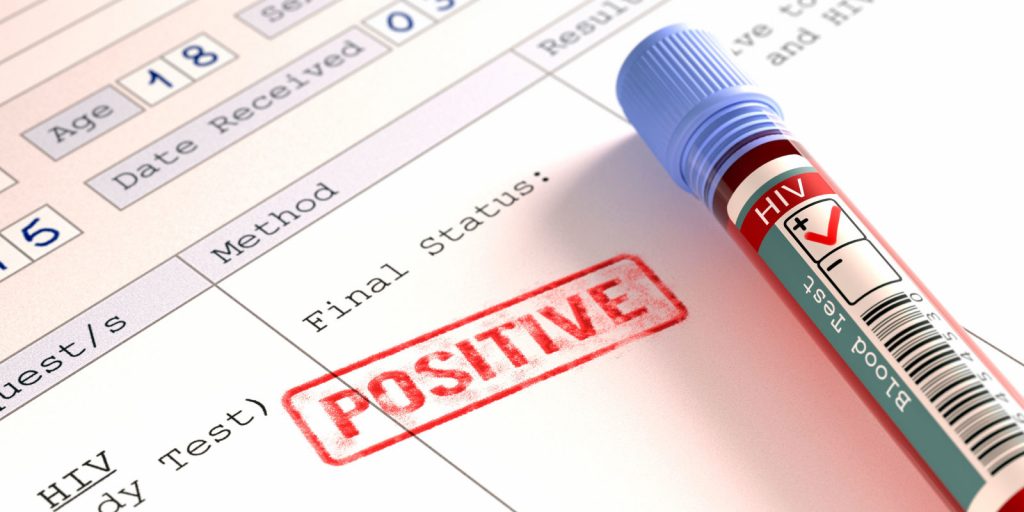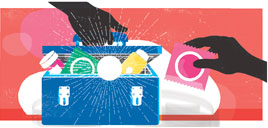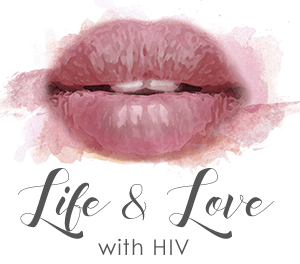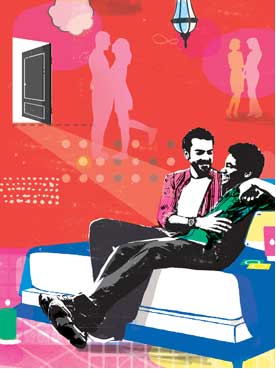
The Peacock Is Well, Striving And Undetectable
September 21, 2016
I Am HIV-positive. This Is What It’s Like To Date.
January 24, 2017
The Peacock Is Well, Striving And Undetectable
September 21, 2016
I Am HIV-positive. This Is What It’s Like To Date.
January 24, 2017By Rob Easton/CATIE
Tara has lived with HIV for 12 years and she’s been a mom for 11. “I don’t know the difference between being a mom and being HIV positive,” she told me over the phone. “For me, they happened at the same time.”
Her voice sounds self-assured, confident. Tara works in the HIV sector, managing a program by and for HIV-positive people, through the Ontario AIDS Network, focused on helping people realize their leadership potential.
When it comes to sex, she says that her confidence comes from the knowledge that HIV is only one part of her life, and mostly her work life at that. The single pill she takes each day reduces her viral load to undetectable levels, which, in turn, makes transmission to her sex partners very, very unlikely.
This knowledge has transformed the way Tara and many others living with HIV view safer sex and what it means to be HIV positive. We now know that in addition to condoms, there are other highly effective ways to prevent HIV transmission. Research has clearly shown that maintaining an undetectable viral load can be an effective strategy (see Treatment as Prevention information), as can the daily use of PrEP by an HIV-negative person. These expanded options in the HIV prevention toolkit are allowing more HIV-positive people to enjoy happy and healthy sex lives and have opened the door to what some are even calling a new poz identity.
“When I leave work at 5 o’clock, I take my HIV hat off to go be a mom,” Tara says. “That’s my second job. When I go home, it’s not about HIV, it’s about being a mom. And then the next day, I go to work, just like any other working person.”
So, where does sex fit in? Tara is sexually active but, as with any single mom, it’s complicated. “I’ve dated since I had my son. I think it’s hard to find the perfect person— whether you’re HIV positive or not. Overall, my experiences have been quite positive.”
Though Pierre Trudeau once said there’s no place for the state in the bedrooms of the nation, many people living with HIV do feel the presence of the law when meeting prospective sex partners. In Canada, engaging in a sexual activity that carries what the courts refer to as “a realistic possibility” of HIV transmission without disclosing your status beforehand can potentially lead to being charged with a serious crime. Because of this, Tara approaches sex cautiously but she says she has been lucky when educating her partners about the chances of transmission.
“If they don’t want to sleep with me because I’m HIV positive, they’re probably not worth sleeping with anyway,” she laughs. When dating, she follows her own advice from the leadership workshops she delivers—recognizing her own self-worth and that self-confidence goes a long way when it comes to disclosing to a partner. “I know that when my self-esteem was low, I met a lot of frogs,” she says. “When I realized my true worth, so did others.” She also noticed that when she was able to tell people with confidence that she was HIV positive, their reactions improved.
“I met this really amazing guy. I had never been on an online dating site before but on my first try had good luck. He was everything I had ever wanted, a true Prince Charming. I had dated so many toads and finally found my prince.” After their third date, they had a hot make-out session in his car. Tara knew that things could go further and she needed to tell him.
The next time they met, she broke the news to him on a park bench. “One thing I’ll never forget is that he held my hand the whole time, and when I said I was HIV positive, he didn’t let go.” She gave him a few websites to check out if he wanted to learn more about HIV and told him that it was OK if things were over, she would understand. She felt good after the talk. He called her later, asking when they could meet again.
Tara considers herself lucky because many people living with HIV do not even consider sex an option. This is especially true for women living with the virus. One study found that only half of HIV-positive women in Canada are sexually active. Of the 1,213 women from BC, Ontario and Quebec who participated in the Canadian HIV Women’s Sexual and Reproductive Health Cohort Study (CHIWOS), 77% had an undetectable viral load yet 49% were not sexually active. This flags that despite successful treatment and a radically reduced risk of transmission, for many HIV-positive women fear, stigma and other issues may get in the way of a satisfying sex life.
"People with HIV have every right to intimacy, pleasure and living the same full life as they did when they were HIV negative."
Psychologist Trevor Hart, director of Ryerson University’s HIV Prevention Lab in Toronto, says that fear of disclosing one’s HIV status and fear of rejection prevent many people from being assertive about their wants and desires. This, in turn, gets in the way of their sexual health and satisfaction. “I try to help people who are HIV positive improve their coping and assertiveness skills so they don’t feel like they are less than just because they’re living with HIV. They’re the same person they always were except they’re also living with HIV.”
People with HIV have every right to intimacy, pleasure and living the same full life as they did when they were HIV negative, Hart adds. When people learn to be more assertive, they are happier and more resilient and tend to make better choices about their sexual health.
Tara found that recognizing and overcoming the stigma she had internalized about her own HIV status was the first step. Once she felt more comfortable and at ease about having HIV, she was able to be more assertive and normalize it for her partners. Her self-esteem has improved because she is no longer anxious about passing the virus to her sex partners. She knows that her undetectable viral load makes the chances of that super slim.
In recent years the use of HIV treatment as prevention (TasP) has gone a long way toward giving peace of mind to people living with the virus. In fact, experts say that the chances of passing HIV during sex are lower for an HIV-positive person with an undetectable viral load than for someone who believes they are HIV negative but may not be. When a serodiscordant couple also uses other forms of prevention, such as condoms or PrEP consistently and correctly, the risk of transmission is close to zero.

"Expanded options in the HIV prevention toolkit are allowing more HIV-positive people to enjoy happy and healthy sex lives."
Using TasP and PrEP, in addition to condoms, as strategies that dramatically reduce the risk of HIV transmission is changing the way some HIV-negative people view people living with the virus. “A person with HIV is no longer necessarily seen as a threat,” says Joanne Otis, researcher and professor of sexology at the Université du Québec à Montréal. “For many people living with HIV, these prevention strategies have truly reopened the door to having a sexual life. However, at the same time, some people don’t yet understand that an undetectable viral load significantly reduces the risk of HIV transmission. This information has been published, but HIV-negative people are still sometimes fearful of having a sexual relationship with an HIV-positive person.” Otis hopes, and strongly believes, that our new understanding of HIV prevention will continue to reduce HIV stigma.
Rick has seen HIV stigma shift and morph over the years. About to mark 30 years since he was diagnosed with HIV, he says that the stigma he experienced at the start of the epidemic continues to influence his outlook. But, he says, it is certainly possible to have a happy sex life as an HIV-positive person.
Before we met for the first time, he told me he would be easy to spot. He sports an eye patch over his left eye, which covers injuries he sustained in a “poorly planned out” suicide attempt when struggling with depression in the early days of AIDS. For Rick’s generation of long-term survivors, the idea of having a healthy sex life sat at the end of a list of hopes and goals that started with simply staying alive.
When he was diagnosed with HIV in the mid-’80s, Rick retreated into his shell. “At first, I thought I was dying, so dating was not a priority,” he says. “So many guys were dying that by the second or third year, I decided I wasn’t going to make any more gay friends because I couldn’t watch one more friend die.”
Despite his grief and his expectation that he would soon become ill himself, Rick eventually met a new partner who told him he was HIV negative. More importantly, for their relationship, this man did not hold the same fear and stigma around sex and HIV that so many others had. “Sex was just a natural thing for him,” Rick says. “It was all about exploring and having fun. No shame, no inhibition. It’s hard to find guys who don’t have any shame or inhibition at all, because it’s so engrained in our culture.” They shared a strong connection, both in and out of the sheets. That was what allowed Rick to regain his sexual freedom, long before the age of TasP and PrEP.
"A healthy, happy sex life is about physical and emotional intimacy, trust and knowing how to ask for what you want."
Expanded options in the HIV prevention toolkit are allowing more HIV-positive people to enjoy happy and healthy sex lives
After seven years together, Rick’s partner fell very ill. He had lost a lot of weight and was dealing with serious mental health problems caused by meningitis. Rick was able to gain power of attorney and put him in the hospital. That’s when he found out that his partner was not HIV negative after all—he had full-blown AIDS.
His partner’s deteriorating health came as a shock, but luckily it was 1996 and the first drug “cocktail” was coming out, just in time to save his life.
Rick believes that the reason his partner avoided getting tested back then was stigma. He believes that his partner, and many others like him, didn’t get tested so he could avoid the dreaded possibility of being HIV positive. Though HIV-positive people are now living long and well, he says, fear and stigma help keep the epidemic alive. Treatment as prevention and PrEP allow some gay men to have sex with less fear, “in particular guys who find themselves barebacking or who are in magnetic (serodiscordant) relationships.” But he views stigma as being the big issue.
Rick sees the ongoing evidence of stigma in his work as coordinator of Gay Poz Sex (GPS), a program that seeks to improve the sex lives of HIV-positive gay men. He says that HIV stigma and fear prevent poz men from making sex- and health-related decisions that would lead to the outcomes they want. Social media are providing more opportunities for sexual connections but don’t always lend themselves to meaningful conversations or connections.
Rick says that a healthy, happy sex life is about physical and emotional intimacy, trust and knowing how to ask for what you want: “It’s about your own comfort level with yourself and exploring your sexuality and what it is that you like. It’s hard to set boundaries if you don’t actually know what you’re into.”
Trevor Hart stresses that a sense of empowerment can help a person living with HIV move beyond the negative feelings that stigma can incite. It helps people “to assert themselves sexually,” he says, “to get what they want out of sex, whether it’s intimacy or pleasure, or other things. People also feel empowered to make safer personal decisions about their sexual health.”
Both Joanne Otis and Trevor Hart agree that one’s physical health, sexual health, well-being and happiness are inextricably linked. “A combination of those elements help you meet your social and sexual needs,” says Joanne.
“It was a self-fulfilling prophecy,” Jonathan Postnikoff told himself the day he tested positive for HIV six years ago, his thoughts spiraling out of control. “‘You’re that little gay boy who grew up fearing HIV and now you’re positive.’ That fear was something I’d been taught to feel. That if you have HIV, you’re somehow dirty,” he told me over the phone from Vancouver.
"When I seroconverted I thought I would be single for the rest of my life. Now seeing the possibilities out there makes me a lot more hopeful that I won’t be single forever."
The fear of becoming HIV positive ran deep and took time to recover from. Today things are very different. Jonathan now identifies openly as an HIV-positive and undetectable gay man, which allows him to cut to the chase and find what he is looking for online, whether it’s sex or dating or true love. “I put my status out there because I want to weed out the people who won’t talk to you because you’re positive.”
Being open and upfront about his HIV status also attracts the type of men he wants: those who are either undetectable like him, on PrEP or just open-minded and willing to learn. It also gets the conversation about HIV and STIs started, which ultimately destigmatizes them. “If he has no STIs and I have no other STIs,” Jonathan says, “then the risk of contracting or transmitting HIV is close to zero. If the guy’s upfront and says, ‘I’m on PrEP,’ and I say ‘I’m poz,’ that’s it. That’s the end of the conversation.”
Jonathan points out that guys who are on PrEP must adhere to their meds and monitor their health similar to the ways that HIV-positive people do, with regular checkups to test for HIV and other STIs. This makes them more aware of their health. “When I’m cruising online and see that someone is on PrEP, it relaxes me and puts me more at ease. It’s an indicator that this guy has done his homework and knows what he’s talking about. That’s the type of guy I seek out.”
He believes that the future is bright for people like him who live in cities where HIV-positive people can expect a degree of understanding and openness to the changes that are happening in HIV treatment and prevention. “When I seroconverted I thought I would be single for the rest of my life. Now seeing the possibilities out there makes me a lot more hopeful that I won’t be single forever,” he laughs.
But that optimism about his own romantic future needs to be expanded beyond the bright lights of the big city to everyone living with the virus, including those in small towns and rural areas. “We still have lots of work to do to make that a reality for everyone living with HIV.”
This article was originally published on The Positive Side in the fall of 2016, here.






